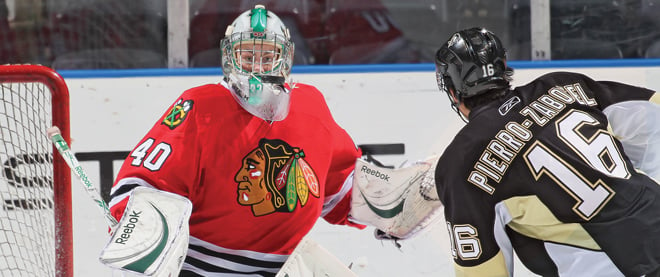Nugent-Hopkins takes the hyphen to new hockey heights
Oilers star Ryan Nugent-Hopkins is blazing a trail for the once-dropped hyphenated hockey name
Claus Andersen/Getty Images
Share

The Edmonton Oilers’ Ryan Nugent-Hopkins has been doing for the hyphen what Wayne Gretzky once did for the tucked-in sweater. Nugent-Hopkins, the first overall pick in the 2011 NHL draft, had Oiler fans wondering about his league-readiness when he was chosen at the head of a slightly weak queue, with his slight frame and his modest (for a top pick) junior stats. But the fast-thinking Nuge tore into the league like a hyena, earning its Rookie of the Month honour for both October and November.
If you like hyphens, Edmonton hockey fans have four of them for you: nobody compares with the Great One, but Nugent-Hopkins, with his puck vision, body type, and tactical insouciance, can fairly be referred to as not-entirely-un-Gretzky-like.
The young magician gives the Oilers their best-ever shot at snagging the Calder Trophy for best rookie, an award that the franchise has somehow got to seven Stanley Cup Finals without ever winning. (Gretzky was declared ineligible in his first NHL season, having already played a full pro year for the Oilers in the old World Hockey Assocation.) But on the Internet, his double-barrelled surname makes for polarization, attracting love from fans of sweater oddities and abuse from haters who think young RNH—as sportscasters sometimes call him in the interest of efficiency—should just “pick a name and stick with it.” It’s probably already too late for the budding legend to take that advice. But others in the game have done so after arriving in pro hockey with compound surnames.
Over the past decade, as children born into an environment of gender equality (and frequent divorce) reach manhood, about 20 hyphenated youngsters have been drafted by NHL teams. About half are French-Canadians, reflecting the more frequent use of compound names in Quebec. Maiden names have always been more persistent in genealogy-conscious Québécois culture, and double-barrelling is particularly convenient when the overall stock of surnames is small. The Oilers drafted goalie Jeff Drouin-Deslauriers in 2002, and although the limits of hockey-sweater labelling had already been successfully tested by players like Rangers’ Norwegian prospect Mats Zuccarello Aasen—who has intermittently gotten away with 15 letters in various environments, but does not use a hyphen—the man fans called “JDD” snipped off the “Drouin” after the draft. Bruising “double hyphenate” Pierre-Luc Letourneau-Leblond, drafted by the Devils in 2004, is still known as “PL3,” but goes by Leblond on his sweater and, these days, in personal life.
Swooping Swedish forward Magnus Pääjärvi-Svensson arrived in Edmonton with the 10th overall pick in 2009. That, at least, is the name Oilers GM Steve Tambellini called out. Young “Pajjan” had spliced his mother’s diaeresis-laden Finnish surname onto his father’s at the age of 12, when the couple divorced, but was actually known as “Svensson Pääjärvi,” with no hyphen. He made a brand-conscious decision to drop the “Svensson” in Edmonton—a Finn-friendly town since the days of Jari Kurri—but Pääjärvi’s older brother, a forward for Swedish club MoDo, is still Bjorn Svensson. (Sadly, Pääjärvi’s Oiler uniform doesn’t accommodate his umlauts.)
The league’s other hyphenated first-rounder is also a Swede. Drafted sixth overall in 2009, defenceman Oliver Ekman-Larsson set the tone for Nugent-Hopkins by hanging onto his two-ton surname, and is playing with a maturity beyond his years outside the spotlight in Phoenix. His name reflects an impressive pedigree: his maternal grandfather, Kenneth Ekman, played defence for Tre Kronor at the 1972 Olympics. Father Patrik Larsson and two uncles all played in the Swedish pros, and his brother, Kevin Ekman-Larsson, born in 1995, is already popping up on 2013 draft lists.
Rookie Ducks winger Devante Smith-Pelly also put a hyphen in the NHL record books this year, playing 26 games before being seconded to Canada’s team at the World Juniors and suffering a broken ankle in a warm-up game. Smith-Pelly, Nugent-Hopkins, and Ekman-Larsson thus form a trio of elite NHL hyphenates, although the Nuge is also hors de combat after hurting his shoulder in Chicago on Jan. 2. It doesn’t appear that the group will grow right away.
No players with dual surnames are near the top of the early Central Scouting rankings for the 2012 draft, though trainspotters (and play-by-play announcers) will want to keep an eye on Jeremy Boyce-Rotevall, an eligible Swedish national who plays for Timrå and is the son of Canadian AHLer Ian Boyce.